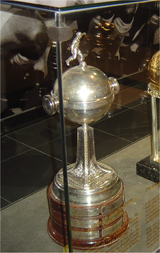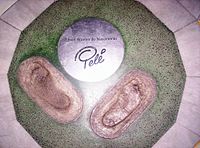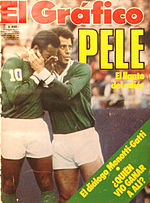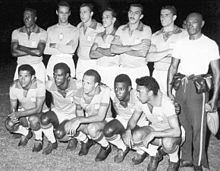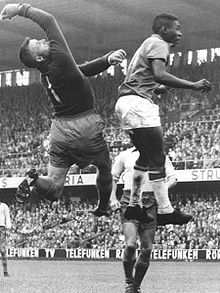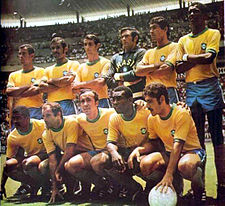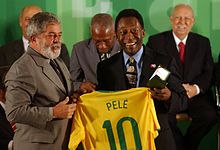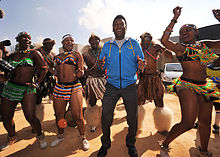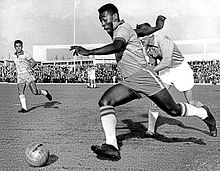
Pelé
Background Information
The articles in this Schools selection have been arranged by curriculum topic thanks to SOS Children volunteers. With SOS Children you can choose to sponsor children in over a hundred countries
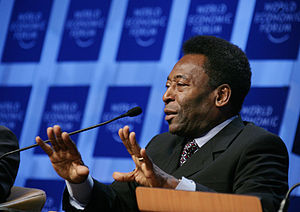 Pelé in 2007 |
|||
| Personal information | |||
|---|---|---|---|
| Full name | Edison Arantes do Nascimento | ||
| Date of birth | 23 October 1940 | ||
| Place of birth | Três Corações, Brazil | ||
| Height | 1.73 m (5 ft 8 in) | ||
| Playing position | Forward Attacking midfielder |
||
| Youth career | |||
| 1953-1956 | Bauru | ||
| Senior career* | |||
| Years | Team | Apps† | (Gls)† |
| 1956–1974 | Santos | 605 | (589) |
| 1975–1977 | New York Cosmos | 56 | (31) |
| Total | 661 | (620) | |
| National team | |||
| 1957–1971 | Brazil | 92 | (77) |
| * Senior club appearances and goals counted for the domestic league only. † Appearances (Goals). |
|||
Edison Arantes do Nascimento (Portuguese pronunciation: [ˈɛtsõ (w)ɐˈɾɐ̃tʃiz du nɐsiˈmẽtu]), better known as Pelé (Brazilian Portuguese: [pe̞ˈlɛ], name given as Edison on birth certificate, born 21 October 1940 – however, Pelé himself claims that he was born on 23 October), is a retired Brazilian footballer. He is regarded by many experts, players, and fans as the best player of all time. In 1999, he was voted Football Player of the Century by the International Federation of Football History & Statistics (IFFHS). In the same year French weekly magazine France Football consulted their former Ballon D'Or winners to elect the Football Player of the Century. Pelé came in first place. Pelé was elected "Athlete of the Century" by the International Olympic Committee and Reuters News Agency in 1999, and by French newspaper L'Équipe in 1981. During his playing days Pelé was for a period the best paid athlete in the world. According to the International Federation of Football History & Statistics (IFFHS) he is the most successful league goal scorer in the world, with 541 league goals. In total Pelé scored 1281 goals in 1363 games. In his native Brazil, Pelé is hailed as a national hero. He is known for his accomplishments and contributions to the game of football. He is also acknowledged for his vocal support of policies to improve the social conditions of the poor (when he scored his 1,000th goal he dedicated it to the poor children of Brazil). During his career, he became known as "The Black Pearl" (Pérola Negra), "The King of Football" (O Rei do Futebol), "The King Pelé" (O Rei Pelé) or simply "The King" (O Rei).
Spotted by football star Waldemar de Brito, Pelé began playing for Santos at 15 and his national team at 16, and won his first World Cup at 17. Despite numerous offers from European clubs, he could not leave Brazil because of a law keeping him there. In 1961 President Janio Quadros had Pelé declared a national treasure, thus enabling Santos to keep Pelé for almost two decades until 1974. With Pelé within their ranks, Santos reached their zenith by winning the 1962 and 1963 Copa Libertadores, the most prestigious club competition in South American football. In 1962 Santos became the first football club ever to win four out of four competitions in a single year, thus achieving the quadruple. Pelé’s electrifying play and penchant for spectacular goals made him a star around the world. His team Santos toured internationally in order to take full advantage of his popularity. Pelé played most of his career as a deep-lying forward. Pelé's technique and natural athleticism have been universally praised and during his playing years he was renowned for his excellent dribbling and passing, his pace, powerful shot, exceptional heading ability, and prolific goalscoring.
He is the all-time leading scorer of the Brazil national football team and is the only footballer to be a part of three World Cup-winning squads. In 1962, his second World Cup victory, he was on the Brazilian squad at the start of the World Cup but because of an injury suffered in the second match, he was not able to play the remainder of the tournament. In November 2007, FIFA announced that he would be awarded the 1962 medal retroactively, making him the only player in the world to have three World Cup winning medals.
Since his retirement in 1977, Pelé has been a worldwide ambassador for football and has undertaken various acting roles and commercial ventures. He is currently the Honorary President of the New York Cosmos.
Early years
"In my mid-teens I also played indoor football, which had just taken off in Bauru, for a team called Radium, and took part in the first futebol de salão championship to be held in Bauru. We won. Futebol de salão was a new thing and I took to it like a fish to water. It’s a lot quicker than football on grass. You have to think really quickly because everyone is close to each other. Learning the game probably helped me think on my feet better. It was through futebol de salão that I first got my chance to play with adults. I was about fourteen, and I can remember that there was a tournament for which I was told I was too young to take part. In the end, I was allowed to play. I ended up top scorer, with fourteen or fifteen goals. That gave me a lot of confidence. I knew then not to be afraid of whatever might come."
Pelé was born in Três Corações, Minas Gerais, Brazil, the son of Fluminense footballer Dondinho (born João Ramos do Nascimento) and Dona Celeste Arantes. He was the oldest of two siblings. He was named after the American inventor Thomas Edison. However, his parents decided to remove the 'i' and call him 'Edson', but there was a mistake on the birth certificate, leading many documents to show his name as 'Edison', not 'Edson', as he is actually called. He was originally nicknamed Dico by his family. He did not receive the nickname "Pelé" until his school days, when it is claimed he was given it because of his pronunciation of the name of his favorite player, local Vasco da Gama goalkeeper Bilé, which he misspoke but the more he complained the more it stuck. In his autobiography, Pelé stated he had no idea what the name means, nor did his old friends. Apart from the assertion that the name is derived from that of Bilé, and that it is Hebrew for "miracle," the word has no known meaning in Portuguese. Another proposed origin of the name, related by Jimmy Magee, one in which Pelé himself considers feasible and indeed mentions in one of his books, is that the name came from an Irish priest working in the slums where Pelé grew up. On seeing Pelé's remarkable talent for football as a young boy, the priest exclaimed "...Ag imirt peile" which in the Irish language means 'playing football'. On hearing this, Pelé's friends started calling him by the same name as they thought the priest was calling him.
Pelé grew up in poverty in Bauru, São Paulo. He earned extra money by working in tea shops as a servant. Taught to play by his father, he could not afford a proper football and usually played with either a sock stuffed with newspaper, tied with a string or a grapefruit. Pelé played for several amateur teams in his youth including Sete de Setembro, Canto do Rio, São Paulinho, and Amériquinha.
Pele had a storied football career in Bauru. He led Bauru Athletic Club juniors (coached by Waldemar de Brito) to three consecutive São Paulo state youth championships between 1954 and 1956. He also dominated Futebol de Salão (indoor football) competitions in the region and won several championships with local team Radium.
Club career
Santos
In 1956, de Brito took Pelé to Santos, an industrial and port city in the state of São Paulo, to try out for professional club Santos FC telling the directors at Santos that the 15-year-old would be "the greatest football player in the world." Pelé was able to impress Santos coach Lula during his trial at the Estádio Vila Belmiro. He subsequently signed a professional contract with the club in June 1956. Pelé was highly promoted in the local media as a future superstar. He made his senior team debut on 7 September 1956 at the age of 16 against Corinthians Santo Andre and had an impressive performance in a 7-1 victory. Pelé scored the first of his record 1281 goals in football during the match.
When the 1957 season started, Pelé was given a starting place in the first team and, at the age of 16, became the top scorer in the league. Ten months after signing professionally, the teenager was called up to the Brazil national team. After the World Cup in 1962, wealthy European clubs such as Real Madrid, Juventus and Manchester United tried to sign the young player, but the government of Brazil declared Pelé an "official national treasure" to prevent him from being transferred out of the country.
Pelé won his first major title with Santos in 1958 as the team won the Campeonato Paulista; Pelé would finish the tournament as top scorer with 58 goals, a record that stands today. A year later, he would help the team earn their first victory in the Torneio Rio-São Paulo with a 3–0 over Vasco da Gama. However, Santos was unable to retain the Paulista title. In 1960, Pelé scored 33 goals to help his team regain the Campeonato Paulista trophy but lost out on the Rio-São Paulo tournament after finishing in 8th place. Another 47 goals from Pelé saw Santos retain the Campeonato Paulista. The club went on to win the Taça Brasil that same year, crushing Bahia in the finals; Pelé finished as top scorer of the tournament with 9 goals. The victory allowed Santos to participate in the Copa Libertadores, the most prestigious club tournament in the Western hemisphere.
Santos' most successful club season started in 1962; the team was seeded in Group 1 alongside Cerro Porteño and Deportivo Municipal, winning every match of their group but one (a 1–1 away tie vs Cerro), with Pelé scoring his first goal in a brace against Cerro. Santos defeated Universidad Católica in the semifinals and met defending champions Peñarol in the finals in which Pelé scored another brace in the playoff match to secure the first title for a Brazilian club. Pelé finished as the second best scorer of the competition with 4 goals. That same year, Santos would defend, with success, the Campeonato Brasiliero (with 37 goals from Pelé), the Taça Brasil (Pelé scoring four goals in the final series against Botafogo), and win the 1962 Intercontinental Cup.
As the defending champions, Santos qualified automatically to the semifinal stage of the 1963 Copa Libertadores. The ballet blanco managed to retain the title in spectacular fashion after impressive victories over Botafogo and Boca Juniors. Pelé helped Santos overcome a Botafogo team that contained legends such as Garrincha and Jairzinho with an agonizing last-minute goal in the first leg of the semifinals and bring the match to 1–1. In the second leg, Pelé produced one of his best performances as a footballer with a hat-trick in the Estádio do Maracanã as Santos crushed Botafogo 0–4 in the second leg. Appearing in their second consecutive final, Santos started the series by winning 3–2 in the first leg and defeating the Boca Juniors of José Sanfilippo and Antonio Rattín 1–2 in La Bombonera, with another goal from Pelé, becoming the first (and so far only) Brazilian team to lift the Copa Libertadores in Argentine soil. Pelé finished the tournament as the topscorer runner-up with 5 goals. Santos lost the Campeonato Paulista after finishing in third place but went on to win the Rio-São Paulo tournament after an impressive 0–3 win over Flamengo in the final, with Pelé providing one goal in the match. Pelé would also help Santos retain the Intercontinental Cup and the Taça Brasil.
Santos tried to defend their title again in 1964 but they were thoroughly beaten in both legs of the semifinals by Independiente. Santos won again the Campeonato Paulista, with Pelé netting 34 goals. The club also shared the Rio-São Paulo title with Botafogo and win the Taça Brasil for the fourth consecutive year. The Santistas would try to resurge in 1965 by winning, for the 9th time, the Campeonato Paulista and the Taça Brasil. In the 1965 Copa Libertadores, Santos started convincingly by winning every match of their group in the first round. In the semifinals, Santos met Peñarol in a rematch of the 1962 final. After two legendary matches, a playoff was needed to break the tie. Unlike 1962, Peñarol came out on top and eliminated Santos 2–1. Pelé would, however, finish as the topscorer of the tournament with eight goals. This proved to be the start of a decline as Santos failed to retain the Torneio Rio-São Paulo.
In 1966, Pelé and Santos also failed to retain the Taça Brasil as O Rei's goals weren't enough to prevent a 9–4 routing by Cruzeiro (led by Tostão) in the final series. Although Santos won the Campeonato Paulista in 1967, 1968 and 1969, Pelé became less and less a contributing factor to the Santistas now-limited success. On 19 November 1969, Pelé scored his 1000th goal in all competitions. This was a highly anticipated moment in Brazil. The goal, called popularly O Milésimo (The Thousandth), occurred in a match against Vasco da Gama, when Pelé scored from a penalty kick, at the Maracanã Stadium.
Pelé states that his most beautiful goal was scored at Rua Javari stadium on a Campeonato Paulista match against São Paulo rival Juventus on 2 August 1959. As there is no video footage of this match, Pelé asked that a computer animation be made of this specific goal. In March 1961, Pelé scored the gol de placa (goal worthy of a plaque), against Fluminense at the Maracanã. Pelé received the ball on the edge of his own penalty area, and ran the length of the field, eluding opposition players, and fired the ball beyond the goalkeeper. The goal was regarded as being so spectacular that a plaque was commissioned with a dedication to the most beautiful goal in the history of the Maracanã.
Pelé’s electrifying play and penchant for spectacular goals made him a star around the world. His team Santos toured internationally in order to take full advantage of his popularity. In 1967, the two factions involved in the Nigerian Civil War agreed to a 48-hour ceasefire so they could watch Pelé play an exhibition game in Lagos. During his time at Santos, Pelé played alongside many gifted players, including Zito, Pepe, and Coutinho; the latter partnered him in numerous one-two plays, attacks, and goals.
New York Cosmos
After the 1972 season (his 17th with Santos), Pelé retired from Brazilian club football although he continued to occasionally suit up for Santos in official competitive matches. Two years later, he came out of semi-retirement to sign with the New York Cosmos of the North American Soccer League (NASL) for the 1975 season. Though well past his prime at this point, Pelé is credited with significantly increasing public awareness and interest in soccer in the United States. He led the Cosmos to the 1977 NASL championship, in his third and final season with the club.
On 1 October 1977, Pelé closed out his legendary career in an exhibition match between the Cosmos and Santos. Santos arrived in New York and New Jersey after previously defeating the Seattle Sounders 2–0. The match was played in front of a capacity crowd at Giants Stadium and was televised in the United States on ABC's Wide World of Sports as well as throughout the world. Pelé's father and wife both attended the match, as well as a number of his friends in sport such as Muhammad Ali and Bobby Moore. Pelé gave a brief pre-match speech during which he asked the crowd to say the word "love" with him three times. He played the first half for the Cosmos and the second half for Santos. Pelé scored his final goal on a direct free kick, driving the ball past the diving Santos goalkeeper. At halftime, the Cosmos retired Pelé's number 10. Pelé presented his Cosmos shirt to his father, who was escorted to the field by Cosmos captain Werner Roth. During the second half, Cosmos striker Ramon Mifflin, who had replaced Pelé when he switched sides at halftime, scored on a deflected cross, and the Cosmos won the match 2–1. After the match, Pelé was embraced by the Cosmos players, including longtime rival Giorgio Chinaglia, and then ran around the field while holding an American flag in his left hand and a Brazilian flag in his right hand. Pelé was soon lifted by several Cosmos players and carried around the field.
National team career
Pelé's first international match was a 2–1 defeat against Argentina on 7 July 1957 at the Maracanã. In that match, he scored his first goal for Brazil aged 16 years and 9 months to become the youngest player to score in International football.
1958 World Cup
Pelé arrived in Sweden sidelined by a knee injury but on his return from the treatment room, his colleagues closed ranks and insisted upon his selection. His first match was against the USSR in the third match of the first round of the 1958 FIFA World Cup, where he gave the assist to Vavá's second goal. He was the youngest player of that tournament, and at the time the youngest ever to play in the World Cup. He scored his first World Cup goal against Wales in quarterfinals, the only goal of the match, to help Brazil advance to semifinals, while becoming the youngest ever World Cup goalscorer at 17 years and 239 days. Against France in the semifinal, Brazil was leading 2–1 at halftime, and then Pelé scored a hat-trick, becoming the youngest in World Cup history to do so.
On 19 June 1958 Pelé became the youngest player to play in a World Cup final match at 17 years and 249 days. He scored two goals in the final as Brazil beat Sweden 5–2. His first goal, a lob over a defender followed by a precise volley shot, was selected as one of the best goals in the history of the World Cup. Following Pelé's second goal, Swedish player Sigvard Parling would later comment; "When Pelé scored the fifth goal in that Final, I have to be honest and say I felt like applauding". When the match ended, Pelé passed out on the field, and had to be attended by the medical staff. He then recovered, and was visibly compelled by the victory to weep as he was being congratulated by his teammates. He finished the tournament with six goals in four matches played, tied for second place, behind record-breaker Just Fontaine, and was named young player of the tournament.
It was in the 1958 World Cup that Pelé began wearing a jersey with number 10 that immortalized him. Recently it has become known that the event was the result of disorganization: the leaders didn't send the shirt numbers of players and it was up to FIFA to choose the number 10 shirt to Pele who was a substitute on the occasion. The press of the time cataloged Pelé as the greatest revelation of the 1958 Cup who was also given retroactively the Silver Ball as the second best player of the tournament, behind Didi.
1962 World Cup
This was expected to be Pelé's World Cup, as he was rated as the best player in the world at the time. In the first match of the 1962 World Cup, against Mexico, Pelé assisted the first goal and then scored the second one, after a run past four defenders, to go up 2–0. He injured himself while attempting a long-range shot against Czechoslovakia. This would keep him out of the rest of the tournament, and forced coach Aymoré Moreira to make his only lineup change of the tournament. The substitute was Amarildo, who performed well for the rest of the tournament. However, it was Garrincha who would take the leading role and carry Brazil to their second World Cup title.
1966 World Cup
The 1966 World Cup was marked, among other things, for the brutal fouling on Pelé, by the Bulgarian and Portuguese defenders. Pelé was the most famous footballer in the world, and Brazil fielded some world champions like Garrincha, Gilmar and Djalma Santos with the addition of other stars like Jairzinho, Tostão and Gérson, leading to high expectations for them. Brazil was eliminated in the first round, playing only three matches. Pelé scored the first goal from a free kick against Bulgaria, becoming the first player to score in three successive FIFA World Cups, but due to his injury, a result of persistent fouling by the Bulgarians, he missed the second game against Hungary. Brazil lost that game and Pelé, although still recovering, was brought back for the last crucial match against Portugal for which the Brazilian coach, Vicente Feola, panicked. He changed the entire defense, including the goalkeeper. In the attack, he maintained Jairzinho and substituted the other two players. In the midfield, he returned to the formation of the first match, even knowing that Pelé was still recovering from his serious injuries. In that game João Morais brutally fouled Pelé, but was not sent off by referee George McCabe, of whom it is acknowledged let "the Portuguese get away with murder". Pelé had to stay on the field limping for the rest of the game, since substitutes were not allowed at that time. After this game he vowed he would not play again in the World Cup, a decision he would later change.
1970 World Cup
Pelé was called to the national team in early 1969, he refused at first, but then accepted and played in six World Cup qualifying matches, scoring six goals. The 1970 World Cup in Mexico was to be Pelé's last. Brazil's squad for the tournament featured major changes in relation to the 1966 squad. Players like Garrincha, Nilton Santos, Valdir Pereira, Djalma Santos and Gilmar had already retired, but the team, with Pelé, Rivelino, Jairzinho, Gérson, Carlos Alberto Torres, Tostão and Clodoaldo, is often considered to be the greatest football team in history.
The front five of Jairzinho, Pele, Gerson, Tostao and Rivelino were all No10s in their own right and together they created an irresistible attacking momentum, with Pelé having central role in Brazil's way to the final, playing a part in 14 of Brazil's 19 goals in the tournament. In the first match, against Czechoslovakia, Pelé gave Brazil a 2–1 lead, by controlling Gerson's long pass with his chest and then scoring. In this match Pelé audaciously attempted to lob goalkeeper Ivo Viktor from the half-way line, only narrowly missing the Czechoslovak goal. Brazil went on to win the match, 4–1. In the first half of the match against England, Pelé nearly scored with a header that was spectacularly saved by Gordon Banks. In the second half, he assisted Jairzinho for the only goal of the match. Against Romania, Pelé opened the score on a direct free kick goal, a strong strike with the outside of his right foot. Later on in the match he scored again to take the score to 3–1. Brazil won by a final score of 3–2. In the quarterfinals against Peru, Brazil won 4–2, with Pelé assisting Tostão for Brazil's third goal. In the semi-finals, Brazil faced Uruguay for the first time since the 1950 World Cup final round match. Jairzinho put Brazil ahead 2–1, and Pelé assisted Rivelino for the 3–1. During that match, Pelé made one of his most famous plays. Tostão gave Pelé a through ball, and Uruguay's goalkeeper Ladislao Mazurkiewicz took notice of it. The keeper ran off of his line to get the ball before Pelé, but Pelé got there first and fooled the keeper by not touching the ball, causing it to roll to the keeper's left, while Pelé went right. Pelé went around the goalkeeper and took a shot while turning towards the goal, but he turned in excess as he shot, and the ball drifted just wide of the far post.
Brazil played Italy in the final, with Pelé scoring the opener, with a header over Italian defender Tarcisio Burgnich. He then made assists on Jairzinho's and Carlos Alberto's goals, the latter one coming after an impressive collective play. Brazil won the match 4–1, keeping the Jules Rimet Trophy indefinitely, and Pelé was named player of the tournament. Burgnich, who marked Pelé during the final, was quoted saying "I told myself before the game, he's made of skin and bones just like everyone else — but I was wrong".
Pelé is the greatest player of all time. He reigned supreme for 20 years. All the others – Diego Maradona, Johan Cruyff, Michel Platini – rank beneath him. There's no one to compare with Pelé.
The best player ever? Pelé. Messi and Cristiano Ronaldo are both great players with specific qualities, but Pelé was better.
Pelé was the only footballer who surpassed the boundaries of logic.
Pelé's last international match was on 18 July 1971 against Yugoslavia in Rio de Janeiro. With Pelé on the field, the Brazilian team's record was 67 wins, 14 draws and 11 losses, . Although Pelé lost many international games, Brazil never lost a match while fielding both Pelé and Garrincha.
South American Championship
Pelé also played in the South American Championship. In the 1959 competition he was named best player of the tournament and was top scorer with 8 goals, as Brazil came second despite being unbeaten in the tournament.
Personal life
On 21 February 1966, Pelé married Rosemeri dos Reis Cholbi. He has two daughters Kelly Cristina (13 January 1967) who married Dr. Arthur DeLuca, and Jennifer (1978), as well as a son Edson ("Edinho" – little Edson, 27 August 1970). The couple divorced in 1982. From 1981 to 1986, Pelé had been romantically linked with Xuxa and was seen influential in launching the career of the model who was 17 when they started to date. In April 1994 Pelé married psychologist and gospel singer Assíria Lemos Seixas, who gave birth on 28 September 1996 to twins Joshua and Celeste through fertility treatments. They are now separated.
In 1970, Pelé was investigated by the Brazilian military dictatorship for suspected leftist sympathies. De-classified documents show Pelé was investigated after being handed a manifesto calling for the release of political prisoners. Pelé himself did not get further involved within political struggles in the country.
On November 13, 2012, Pelé underwent a hip operation, called a success, in Sao Paulo.
After football
In February 2012, Legends 10 began handling the Pelé brand and brought all marketing and management efforts under one roof, including all intellectual property rights, global licensing, branding, endorsements, and public appearances.
The most notable area of Pelé's life since football is his ambassadorial work. In 1992, Pelé was appointed a UN ambassador for ecology and the environment.
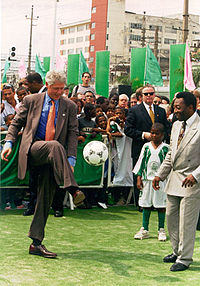
He was awarded Brazil's Gold Medal for outstanding services to the sport in 1995; Brazilian President Fernando Henrique Cardoso appointed him to the position of Extraordinary Minister for Sport, and he was appointed a UNESCO Goodwill Ambassador. During this time he proposed legislation to reduce corruption in Brazilian football, which became known as the "Pelé law." Pelé left his position in 2001 after he was accused of involvement in a corruption scandal, although nothing was proven, and it was denied by UNICEF. In 1997, Pelé received an honorary Knight Commander of the Order of the British Empire from Queen Elizabeth II, at a ceremony in Buckingham Palace.
Pelé scouted for Premier League club Fulham in 2002. He was chosen to do the draw for the qualification groups for the 2006 FIFA World Cup finals.
Pelé has published several autobiographies, starred in documentary and semi-documentary films, and composed musical pieces, including the entire soundtrack for the film Pelé in 1977. He appeared, alongside other footballers of the 1960s and 1970s, with Michael Caine, and Sylvester Stallone, in the 1981 film Escape to Victory, about an attempted escape from a World War II German POW camp.
In 2005, Pelé received a lifetime achievement award from the BBC and, in June 2006, helped inaugurate the 2006 FIFA World Cup finals, alongside supermodel Claudia Schiffer. Pelé also produced an international ad campaign for drug company Pfizer to promote Viagra and raise world awareness of erectile dysfunction.
Pelé was guest of honour at the world's oldest football club, Sheffield's 150th anniversary match v Inter Milan in November 2007. Inter won 5–2 in front of an appreciative crowd of nearly 19,000 at Bramall Lane. As part of his visit, Pelé opened an exhibition which included the first public showing in 40 years of the original hand-written rules of football.
In 2009, he cooperated with Ubisoft on arcade football game Academy of Champions: Soccer for the Wii and appeared in the game as a coach to its players.
On 1 August 2010, Pelé was introduced as the Honorary President of a revived New York Cosmos, aiming to field a team in Major League Soccer. On 3 August 2011, it was reported that Santos were considering bringing him out of retirement for a cameo role in the 2011 FIFA Club World Cup, although these rumours later turned out to be false.
In 2012, Pelé was awarded an honorary degree from the University of Edinburgh for "significant contribution to humanitarian and environmental causes, as well as his sporting achievements", his first such degree from a European university.
On 12 August, Pelé appeared at the closing ceremony of the 2012 Summer Olympics in London, following the handover section to the next host city for the 2016 Summer Olympics, Rio de Janeiro.
Honours
Country
- Roca Cup: 1957, 1963
- FIFA World Cup:
- Winner: 1958
- Winner: 1962
- Winner: 1970
- Copa América:
- Runner-up: 1959
- Cruz Cup: 1958, 1962, 1968
- Bernardo O'Higgins Cup: 1959
- Atlantic Cup: 1960
- Oswaldo Cruz Cup: 1958, 1962, 1968
Club
- Copa Libertadores (2): 1962, 1963
- Intercontinental Supercup (1): 1968
- Supercopa de Campeones Intercontinentales (1): 1968
- Intercontinental Cup (2): 1962, 1963
- Campeonato Brasileiro Série A (6): 1961, 1962, 1963, 1964, 1965, 1968
- Torneio Rio-São Paulo (4): 1959, 1963, 1964, 1966
- Campeonato Paulista (10): 1958, 1960, 1961, 1962, 1964, 1965, 1967, 1968, 1969, 1973
- North American Soccer League, Soccer Bowl (1): 1977
- North American Soccer League, Atlantic Conference Championship (1): 1977
In total Pelé has 40 official titles.
Individual
 Santos
Santos- Intercontinental Cup: All-Time Leading Scorer
- Copa Libertadores Top Scorer (1): 1965.
- Campeonato Brasileiro Série A Top Scorer (3): 1961, 1963, 1964.
- Campeonato Paulista Top Scorer (11): 1957, 1958, 1959, 1960, 1961, 1962, 1963, 1964, 1965, 1969, 1973.
- Torneio Rio-São Paulo Top Scorer (1): 1963.
- FIFA World Cup (Best Young Player):
- Winner (1): 1958
- FIFA World Cup (Silver Boot): 1958
- FIFA World Cup Silver Ball: 1958
- FIFA World Cup Golden Ball (Best Player):
- Winner (1): 1970
- Copa America Best Player: 1959
- The World´s most successful Top Division Goal Scorer: 541 goals
- All time Top Scorer in one calendar year: 127 goals(1959)
- World record number of hat tricks: 92
- BBC Sports Personality of the Year Overseas Personality:
- Winner (1): 1970
- BBC Sports Personality of the Year Lifetime Achievement Award:
- Winner (1): 2005
- Greatest football player to have ever played the game, by Golden Foot: 2012
- Athlete of the Century, by Reuters News Agency: 1999
- Athlete of the Century, elected by International Olympic Committee: 1999
- Athlete of the Century, elected by world wide journalists, poll by French daily L'Equipe: 1981
- South American Footballer of the Year: 1973
- Inducted into the American National Soccer Hall of Fame in 1993.
- Knight Commander of the Order of the British Empire: 1997
- In 1989 DPR Korea issued a postage stamp depicting Pelé.
- UNICEF Football Player of the Century: 1999
- TIME One of the 100 Most Important People of the 20th century: 1999
- FIFA Player of the Century : 2000
- Football Player of the Century, elected by France Football's Golden Ball Winners : 1999
- Football Player of the Century, by IFFHS International Federation of Football History and Statistics: 1999
- South America Football Player of the Century, by IFFHS International Federation of Football History and Statistics: 1999
- Laureus World Sports Awards Lifetime Achievement Award from South African President Nelson Mandela: 2000
In December 2000, Pelé and Maradona shared the prize of FIFA Player of the Century by FIFA. The award was originally intended to be based upon votes in a web poll, but after it became apparent that it favoured Diego Maradona, many observers complained that the Internet nature of the poll would have meant a skewed demographic of younger fans who would have seen Maradona play, but not Pelé. FIFA then appointed a "Family of Football" committee of FIFA members to decide the winner of the award. The committee chose Pelé. Since Maradona was winning the Internet poll, however, it was decided he and Pelé should share the award.
- Honorary degree from the University of Edinburgh celebrating Pelé’s "significant contribution to humanitarian and environmental causes, as well as his sporting achievements": 2012
- Prize from the French Academy of Sports, Award given to a player of a team sport for the very first time: 1971
- Red Medal of Paris, Given by the City Hall of the French Capital: 1971
- Sword of Soccer Honour, Given by the English Soccer Annual. The sword was handmade by the Queen’s weapon manufacturers. Pelé was the first ever non-British person to receive this award: 1966
- Knight of the Legion d’Honneur of France, Award given by the French Government: 1963
A consensus of media and expert polls rank Pelé as the greatest footballer of all time.
Career statistics
Club
Pelé's goalscoring record is often reported as being 1281 goals in 1363 games. This figure includes goals scored by Pelé in friendly club matches, for example, international tours Pelé completed with Santos and the New York Cosmos, and a few games Pelé played in for armed forces teams during his national service in Brazil.
The tables below record every goal Pelé scored in major club competitions for Santos and the New York Cosmos. During much of Pelé's playing career in Brazil there was no national league championship. From 1960 onwards the Brazilian Football Confederation (CBF) were required to provide meritocratic entrants for the then-new Copa Libertadores, a South American international club competition broadly equivalent to the European Cup. To enable them to do this, the CBF organised two national competitions: the Taça de Prata and Taça Brasil. A national league championship, the Campeonato Brasileiro, was first played in 1971, alongside traditional state and interstate competitions such as the Campeonato Paulista and the Torneio Rio-São Paulo.
The number of league goals scored by Pelé is listed as 589 in 605 games, which is a world record for League competitions. This number is the sum of the goals scored by Pelé in domestic league-based competitions: the Campeonato Paulista (SPS), Torneio Rio-São Paulo (RSPS), Taça de Prata and Campeonato Brasileiro. The Taça Brasil was a national competition organised on a knockout basis.
| Club | Season | Domestic competitions | Domestic competitions subtotal |
International club competitions | Official total |
Total inc. friendlies |
|||||||||||||||
|---|---|---|---|---|---|---|---|---|---|---|---|---|---|---|---|---|---|---|---|---|---|
| SPS | RSPS | T. de Prata | Camp. Brasil. | T. Brasil | Copa Libertadores | Intercontinental Cup | |||||||||||||||
| Apps | Goals | Apps | Goals | Apps | Goals | Apps | Goals | Apps | Goals | Apps | Goals | Apps | Goals | Apps | Goals | Apps | Goals | Apps | Goals | ||
| Santos | 1956 | 0 | 0 | 0 | 0 | 0 | 0 | 2 | 2 | ||||||||||||
| 1957 | 29 | 36 | 9 | 5 | 38 | 41 | 38 | 41 | 67 | 57 | |||||||||||
| 1958 | 38 | 58 | 8 | 8 | 46 | 66 | 46 | 66 | 60 | 80 | |||||||||||
| 1959 | 32 | 45 | 7 | 6 | 4 | 2 | 39 | 51 | 43 | 53 | 83 | 100 | |||||||||
| 1960 | 30 | 33 | 3 | 0 | 0 | 0 | 33 | 33 | 0 | 0 | 0 | 0 | 33 | 33 | 66 | 59 | |||||
| 1961 | 26 | 47 | 7 | 8 | 5 | 7 | 33 | 55 | 0 | 0 | 0 | 0 | 38 | 62 | 74 | 110 | |||||
| 1962 | 26 | 37 | 0 | 0 | 5 | 2 | 26 | 37 | 4 | 4 | 2 | 5 | 37 | 48 | 52 | 67 | |||||
| 1963 | 19 | 22 | 8 | 14 | 4 | 8 | 27 | 36 | 4 | 5 | 1 | 2 | 36 | 51 | 52 | 66 | |||||
| 1964 | 21 | 34 | 4 | 3 | 6 | 7 | 25 | 37 | 0 | 0 | 0 | 0 | 31 | 44 | 47 | 57 | |||||
| 1965 | 30 | 49 | 7 | 5 | 4 | 2 | 37 | 54 | 7 | 8 | 0 | 0 | 48 | 64 | 66 | 97 | |||||
| 1966 | 14 | 13 | 0 | 0 | 5 | 2 | 14 | 13 | - | - | 0 | 0 | 19 | 15 | 38 | 31 | |||||
| 1967 | 18 | 17 | 14 | 9 | 0 | 0 | 32 | 26 | - | - | 0 | 0 | 32 | 26 | 65 | 56 | |||||
| 1968 | 21 | 17 | 17 | 11 | 0 | 0 | 38 | 28 | 0 | 0 | 0 | 0 | 38 | 28 | 73 | 55 | |||||
| 1969 | 25 | 26 | 12 | 12 | 37 | 38 | - | - | 0 | 0 | 37 | 38 | 61 | 57 | |||||||
| 1970 | 15 | 7 | 13 | 4 | 28 | 11 | 0 | 0 | 0 | 0 | 28 | 11 | 54 | 47 | |||||||
| 1971 | 19 | 8 | 21 | 1 | 40 | 9 | 0 | 0 | 0 | 0 | 40 | 9 | 72 | 29 | |||||||
| 1972 | 20 | 9 | 16 | 5 | 36 | 14 | 0 | 0 | 0 | 0 | 36 | 14 | 74 | 50 | |||||||
| 1973 | 19 | 11 | 30 | 19 | 49 | 30 | 0 | 0 | 0 | 0 | 49 | 30 | 66 | 52 | |||||||
| 1974 | 10 | 1 | 17 | 9 | 27 | 10 | 0 | 0 | 0 | 0 | 27 | 10 | 45 | 19 | |||||||
| All | 412 | 470 | 53 | 49 | 56 | 36 | 84 | 34 | 33 | 30 | 605 | 589 | 15 | 17 | 3 | 7 | 656 | 643 | 1115 | 1088 | |
| Club | Season | League | Post season | Other | Total | ||||
|---|---|---|---|---|---|---|---|---|---|
| Apps | Goals | Apps | Goals | Apps | Goals | Apps | Goals | ||
| NY Cosmos | 1975 | 9 | 5 | 14 | 10 | 23 | 15 | ||
| 1976 | 22 | 13 | 2 | 2 | 18 | 11 | 42 | 26 | |
| 1977 | 25 | 13 | 6 | 4 | 11 | 6 | 42 | 23 | |
| All | 56 | 31 | 8 | 6 | 43 | 27 | 107 | 64 | |
National team
Pelé is the top scorer of the Brazil national football team with 77 goals in 92 official appearances. In addition, he has scored 18 times in 21 unofficial games. This makes an unofficial total of 113 games and 95 goals. He has also scored 12 goals and provided 9 assists in 14 World Cup appearances, including 4 goals and 7 assists in 1970. Pelé shares with Uwe Seeler the achievement of being the only two footballers to have scored in four separate World Cup tournaments.
| FIFA World Cup goals | |||||||
|---|---|---|---|---|---|---|---|
| Date | Venue | Opponent | Score | Result | World Cup | Round | |
| 19 June 1958 | Ullevi, Gothenburg, Sweden | 1 – 0 | 1–0 | 1958 | Quarterfinal | ||
| 24 June 1958 | Råsunda Stadium, Solna, Sweden | 1 – 3 | 2–5 | 1958 | Semifinal | ||
| 24 June 1958 | Råsunda Stadium, Solna, Sweden | 1 – 4 | 2–5 | 1958 | Semifinal | ||
| 24 June 1958 | Råsunda Stadium, Solna, Sweden | 1 – 5 | 2–5 | 1958 | Semifinal | ||
| 29 June 1958 | Råsunda Stadium, Solna, Sweden | 1 – 3 | 2–5 | 1958 | Final | ||
| 29 June 1958 | Råsunda Stadium, Solna, Sweden | 2 – 5 | 2–5 | 1958 | Final | ||
| 30 May 1962 | Estadio Sausalito, Viña del Mar, Chile | 2 – 0 | 2–0 | 1962 | Group stage | ||
| 12 July 1966 | Goodison Park, Liverpool, England | 1 – 0 | 2–0 | 1966 | Group stage | ||
| 3 June 1970 | Estadio Jalisco, Guadalajara, Mexico | 2 – 1 | 4–1 | 1970 | Group stage | ||
| 10 June 1970 | Estadio Jalisco, Guadalajara, Mexico | 1 – 0 | 3–2 | 1970 | Group stage | ||
| 10 June 1970 | Estadio Jalisco, Guadalajara, Mexico | 3 – 1 | 3–2 | 1970 | Group stage | ||
| 21 June 1970 | Estadio Azteca, Mexico City, Mexico | 1 – 0 | 4–1 | 1970 | Final | ||
| International appearances (92) and goals (77) | ||||||
|---|---|---|---|---|---|---|
| Date | Venue | Home | Result | Visitor | Competition | Goals |
| 7 July 1957 | Rio de Janeiro | 1 – 2 | Roca Cup | 1 | ||
| 10 July 1957 | São Paulo | 2 – 0 | Roca Cup | 1 | ||
| 4 May 1958 | Rio de Janeiro | 5 – 1 | Oswaldo Cruz Cup | 1 | ||
| 14 May 1958 | Rio de Janeiro | 4 – 0 | Friendly | |||
| 18 May 1958 | São Paulo | 3 – 1 | Friendly | 2 | ||
| 15 June 1958 | Gothenburg | 2 – 0 | World Cup | |||
| 19 June 1958 | Gothenburg | 1 – 0 | World Cup | 1 | ||
| 24 June 1958 | Stockholm | 5 – 2 | World Cup | 3 | ||
| 29 June 1958 | Stockholm | 5 – 2 | World Cup | 2 | ||
| 10 March 1959 | Buenos Aires | 2 – 2 | Copa América | 1 | ||
| 15 March 1959 | Buenos Aires | 3 – 0 | Copa América | 2 | ||
| 21 March 1959 | Buenos Aires | 4 – 2 | Copa América | 1 | ||
| 26 March 1959 | Buenos Aires | 3 – 1 | Copa América | |||
| 29 March 1959 | Buenos Aires | 4 – 1 | Copa América | 3 | ||
| 4 April 1959 | Buenos Aires | 1 – 1 | Copa América | 1 | ||
| 13 May 1959 | Rio de Janeiro | 2 – 0 | Friendly | |||
| 17 September 1959 | Rio de Janeiro | 7 – 0 | O'Higgins Cup | 3 | ||
| 20 September 1959 | São Paulo | 1 – 0 | O'Higgins Cup | |||
| 29 April 1960 | Cairo | 0 – 5 | Friendly | |||
| 1 May 1960 | Alexandria | 1 – 3 | Friendly | 3 | ||
| 6 May 1960 | Cairo | 0 – 3 | Friendly | |||
| 10 May 1960 | Copenhagen | 3 – 4 | Friendly | |||
| 9 July 1960 | Montevideo | 0 – 1 | Atlantic Cup | |||
| 12 July 1960 | Rio de Janeiro | 5 – 1 | Atlantic Cup | 1 | ||
| 21 April 1962 | Rio de Janeiro | 6 – 0 | Oswaldo Cruz Cup | 1 | ||
| 24 April 1962 | São Paulo | 4 – 0 | Oswaldo Cruz Cup | 2 | ||
| 6 May 1962 | São Paulo | 2 – 1 | Friendly | |||
| 9 May 1962 | Rio de Janeiro | 1 – 0 | Friendly | 1 | ||
| 12 May 1962 | Rio de Janeiro | 3 – 1 | Friendly | 1 | ||
| 16 May 1962 | São Paulo | 3 – 1 | Friendly | 2 | ||
| 30 May 1962 | Viña del Mar | 2 – 0 | World Cup | 1 | ||
| 2 June 1962 | Viña del Mar | 0 – 0 | World Cup | |||
| 13 April 1963 | São Paulo | 2 – 3 | Roca Cup | |||
| 16 April 1963 | Rio de Janeiro | 5 – 2 | Roca Cup | 3 | ||
| 21 April 1963 | Lisbon | 1 – 0 | Friendly | |||
| 28 April 1963 | Paris | 2 – 3 | Friendly | 3 | ||
| 2 May 1963 | Amsterdam | 1 – 0 | Friendly | |||
| 5 May 1963 | Hamburg | 1 – 2 | Friendly | 1 | ||
| 12 May 1963 | Milan | 3 – 0 | Friendly | |||
| 30 May 1964 | Rio de Janeiro | 5 – 1 | Taça das Nações | 1 | ||
| 3 June 1964 | São Paulo | 0 – 3 | Taça das Nações | |||
| 7 June 1964 | Rio de Janeiro | 4 – 1 | Taça das Nações | 1 | ||
| 2 June 1965 | Rio de Janeiro | 5 – 0 | Friendly | 3 | ||
| 6 June 1965 | Rio de Janeiro | 2 – 0 | Friendly | 1 | ||
| 9 June 1965 | Rio de Janeiro | 0 – 0 | Friendly | |||
| 17 June 1965 | Orano | 0 – 3 | Friendly | 1 | ||
| 24 June 1965 | Porto | 0 – 0 | Friendly | |||
| 30 June 1965 | Stockholm | 1 – 2 | Friendly | 1 | ||
| 4 July 1965 | Moscow | 0 – 3 | Friendly | 2 | ||
| 21 November 1965 | Rio de Janeiro | 2 – 2 | Friendly | 1 | ||
| 19 May 1966 | Rio de Janeiro | 1 – 0 | Friendly | |||
| 4 June 1966 | São Paulo | 4 – 0 | Friendly | 1 | ||
| 8 June 1966 | Rio de Janeiro | 2 – 1 | Friendly | |||
| 12 June 1966 | Rio de Janeiro | 2 – 1 | Friendly | 2 | ||
| 15 June 1966 | Rio de Janeiro | 2 – 2 | Friendly | 1 | ||
| 25 June 1966 | Glasgow | 1 – 1 | Friendly | |||
| 30 June 1966 | Göteborg | 2 – 3 | Friendly | |||
| 12 July 1966 | Liverpool | 2 – 0 | World Cup | 1 | ||
| 19 July 1966 | Liverpool | 3 – 1 | World Cup | |||
| 25 July 1968 | Asunción | 0 – 4 | Oswaldo Cruz Cup | 2 | ||
| 28 July 1968 | Asunción | 1 – 0 | Oswaldo Cruz Cup | |||
| 31 October 1968 | Rio de Janeiro | 1 – 2 | Friendly | |||
| 3 November 1968 | Belo Horizonte | 2 – 1 | Friendly | 1 | ||
| 6 November 1968 | Rio de Janeiro | 2 – 1 | FIFA XI | Friendly | ||
| 14 December 1968 | Rio de Janeiro | 2 – 2 | Friendly | |||
| 17 December 1968 | Rio de Janeiro | 3 – 3 | |
Friendly | 1 | |
| 7 April 1969 | Porto Alegre | 2 – 1 | Friendly | |||
| 9 April 1969 | Rio de Janeiro | 3 – 2 | Friendly | 1 | ||
| 12 June 1969 | Rio de Janeiro | 2 – 1 | Friendly | |||
| 6 August 1969 | Bogotá | 0 – 2 | World Cup Qualifiers | |||
| 10 August 1969 | Caracas | 0 – 5 | World Cup Qualifiers | 2 | ||
| 17 August 1969 | Asunción | 0 – 3 | World Cup Qualifiers | |||
| 21 August 1969 | Rio de Janeiro | 6 – 2 | World Cup Qualifiers | 1 | ||
| 24 August 1969 | Rio de Janeiro | 6 – 0 | World Cup Qualifiers | 2 | ||
| 31 August 1969 | Rio de Janeiro | 1 – 0 | World Cup Qualifiers | 1 | ||
| 4 March 1970 | Porto Alegre | 0 – 2 | Friendly | |||
| 8 March 1970 | Rio de Janeiro | 2 – 1 | Friendly | 1 | ||
| 22 March 1970 | São Paulo | 5 – 0 | Friendly | 2 | ||
| 26 March 1970 | Rio de Janeiro | 2 – 1 | Friendly | |||
| 12 April 1970 | Rio de Janeiro | 0 – 0 | Friendly | |||
| 26 April 1970 | São Paulo | 0 – 0 | Friendly | |||
| 29 April 1970 | Rio de Janeiro | 1 – 0 | Friendly | |||
| 3 June 1970 | Guadalajara | 4 – 1 | World Cup | 1 | ||
| 7 June 1970 | Guadalajara | 1 – 0 | World Cup | |||
| 10 June 1970 | Guadalajara | 3 – 2 | World Cup | 2 | ||
| 14 June 1970 | Guadalajara | 4 – 2 | World Cup | |||
| 17 June 1970 | Guadalajara | 3 – 1 | World Cup | |||
| 21 June 1970 | Mexico City | 4 – 1 | World Cup | 1 | ||
| 30 September 1970 | Rio de Janeiro | 2 – 1 | Friendly | |||
| 4 October 1970 | Santiago de Chile | 1 – 5 | Friendly | 1 | ||
| 11 July 1971 | São Paulo | 1 – 1 | Friendly | 1 | ||
| 18 July 1971 | Rio de Janeiro | 2 – 2 | |
Friendly | ||
Summary
Pelé numbers differ between sources mostly due friendly and benefit games. The RSSSF states that Pelé scored 767 goals in 831 official games, 1281 goals in 1367 overall while he was active, 1284 in 1375 taking into account benefit games after retirement. The following table is a compendium of sources that include Santos FC and FIFA among others.
| Matches | Goals | Ratio | |
|---|---|---|---|
| Torneio Rio – São Paulo | 53 | 49 | 0.92 |
| First Division | 560 | 541 | 0.97 |
| National Cups | 89 | 66 | 0.74 |
| International Cups | 28 | 27 | 0.96 |
| Brazil | 92 | 77 | 0.84 |
| goals in tournaments | 844 | 760 | 0.90 |
| Friendly matches | 562 | 522 | 0.92 |
| Total | 1366 | 1282 | 0.94 |
| Matches | Goals | Ratio | |
|---|---|---|---|
| International matches | 503 | 479 | 0.95 |
| National matches | 863 | 803 | 0.93 |
| Total | 1366 | 1282 | 0.94 |
| Matches | Goals | Ratio | |
|---|---|---|---|
| Santos FC | 1115 | 1088 | 0.98 |
| New York Cosmos | 107 | 66 | 0.62 |
| Brazil | 110 | 95 | 0.86 |
| Other | 34 | 33 | 0.97 |
| Total | 1366 | 1282 | 0.94 |
Acting and film career
- Os Estranhos (1969) (TV series)
- O Barão Otelo no Barato dos Bilhões (1971)
- A Marcha (1973)
- Os Trombadinhas (1978)
- Escape to Victory (1981)
- A Minor Miracle (1983)
- Pedro Mico (1985)
- Os Trapalhões e o Rei do Futebol (1986)
- Hotshot (1987)
- Solidão, Uma Linda História de Amor (1990)
- Mike Bassett: England Manager (2001)
- ESPN SportsCentury (2004)
- Pelé Eterno (2004) – a documentary about Pelé's career
- Puskás Hungary (2009)
Music
In 1969 Pelé recorded an EP (33-1/3 RPM 7 inch) titled "Tabelinha", on which he sings with Elis Regina and plays guitar. Its two tracks, "Perdão Não Tem" and "Vexamão", were written by Pelé.
